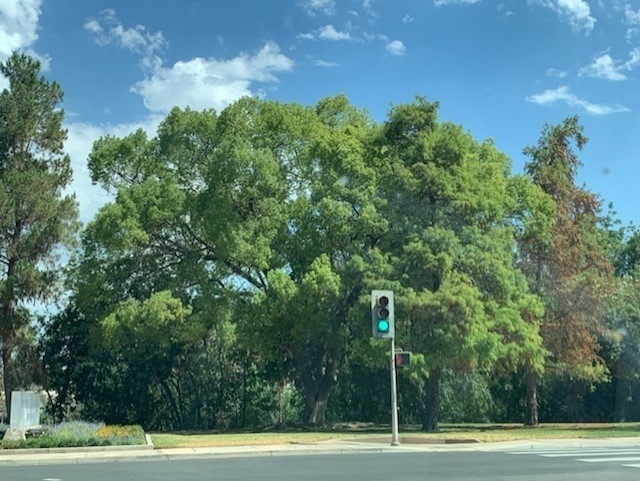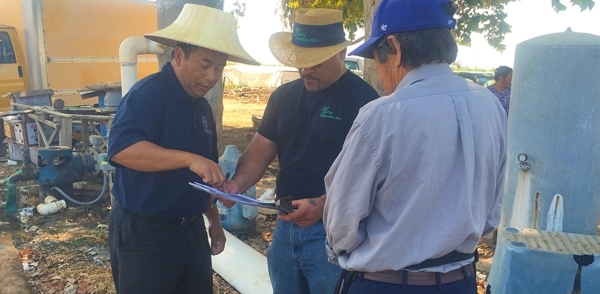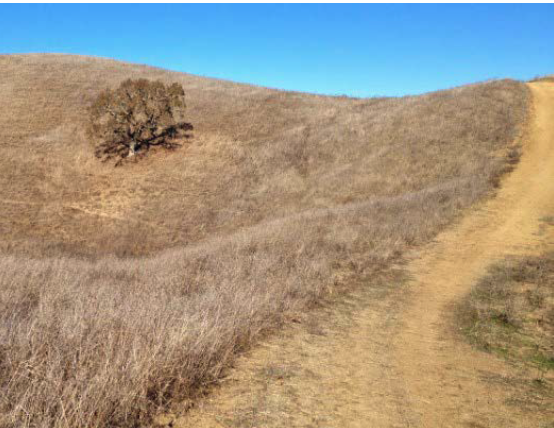Posts Tagged: Principles of Community
UC ANR's commitment to helping youth thrive
Dear Colleagues,
As you've undoubtedly seen in news reports for the past several months, our society continues to become more polarized. One aspect of that has been a back-pedaling by many corporations from expanded goals related to diversity, equity and inclusion (DEI). One of those companies is a long-time partner that is a major supporter of youth development programs nationwide, including 4-H. Tractor Supply Company, Inc., recently issued a statement expressing a new focus on “activities and giving” connected to their mission and away from other initiatives.
In response to this statement, and amidst concerns expressed by some members within the communities we serve, UC ANR and our 4-H Youth Development Program affirm our mission to serve all youth in every county in the state of California as well as our commitment to DEI goals. We also recognize that every business has the right to conduct its business affairs in a manner consistent with their needs and goals so long as they are within the law and common decency. Although Tractor Supply's action is disappointing to many in our community, UC ANR joins with the National 4-H Council Board of Trustees in maintaining our relationship with the company at this time.
The challenge we face is that this is a very polarizing issue and there is no position we can take that will satisfy everyone. Questions have been raised as to why are we taking this position and how is it different from the decision we made to sever relationships with the National Rifle Association (NRA) in 2018? While both issues fall into how best to adhere to our belief in the First Amendment guarantee of free speech, the key difference between the two falls into a careful balance of how to also live up to our values, particularly our UC ANR Principles of Community.
In 2018, our decision was to “…part ways with the NRA now because they have become a polarizing, divisive force across the U.S. and their recent treatment of young adults does not align with 4-H values on civic engagement.” Contrary to the violent rhetoric that NRA leadership was using, the recent message from Tractor Supply emphasized their ongoing commitment to their corporate values and was offered in a courteous manner.
I believe we should view this as a teachable moment for ourselves, for the 4-H program, and all others who may be affected. A great article in The Conversation recently highlighted that Americans love free speech, survey finds − until they realize everyone else has it, too:
“As the founders knew, a respect for diverse viewpoints and the ability to express those views – good, bad and harmful alike – in the public sphere are essential to a healthy democracy.”
As one of the nation's largest youth development programs, California 4-H continues to stand behind the integrity of our research-based resources that produce hands-on learning in science, agriculture, health and well-being, leadership development and civic engagement. 4-H does not endorse or oppose any legislation or political stance. The challenge and the opportunity we face is how to best instill critical thinking among our youth as part of helping them grow to their fullest potential and to develop as leaders.
The best way we move forward to a more positive future for all is to engage with those we may have a difference of opinion with; we need to build community, not cut off those with different positions. Toward the shared goal of seeing our young people thrive, I hope we can continue to find the common ground upon which we can nurture and support all California youth. For more information, visit the California 4-H website using https://4h.ucanr.edu/contactus/County/.
Sincerely,
Glenda Humiston
Vice President
UC ANR Climate Notification
Dear UC ANR Community,
As we begin the 2024-2025 year, I want to reaffirm our UC ANR Principles of Community and ensure that all members of our community understand both the rights and the responsibilities of free expression in the UC ANR context.
This year we expect the continuation of active discourse on various issues impacting our communities, nation and world. There are many avenues for academics and staff to advocate for their personal views within their communities. We actively encourage members of our UC ANR community to make your voices heard on issues that matter to you.
To ensure that everyone within the UC ANR community can express their perspectives while engaging fully in their learning, teaching, work, and research, UC ANR must also take action to protect our community from harassment or threats, impediments to access to buildings, and from violence of any kind. UC ANR complies with UC, state and federal policies that provide safeguards for state and federally protected identities and ensure safe and timely and full access to our facilities for all.
The California Legislature requests the University of California system to maintain consistency of implementation and enforcement of these policies. We are supportive of this request as it undergirds our principles of community and values and will help support a healthy, thriving climate for all members of our UC ANR community.
It is important to understand the rules, regulations, and resources that exist to achieve these goals. Please review the UC ANR Climate website for detailed information on policies, procedures, and resources related to freedom of expression and supporting a safe and inclusive environment for all members of the UC ANR community. A pdf of this letter on letterhead is attached.
We look forward to a productive, vibrant and welcoming year in our UC ANR communities.
Glenda Humiston, Vice President
Elizabeth Moon, Director of Workplace & Inclusion
ANR Climate Notification.ltr FINAL
Lawn-pocalypse! Surviving Drought
Ah, summer! The season of sunburns, pool parties, and… lawn droughts. If your once lush, green carpet now looks like a crunchy brown doormat, you're not alone. Let's dive into why your yard is staging a dramatic death scene and what you can do to...

Bermuda grass and weeds overtaking drought stressed turf grass.
Climate-Change Resources
University of California UC ANR Green Blog (Climate Change and Other Topics) https://ucanr.edu/blogs/Green/index.cfm?tagname=climate%20change (full index)
Examples:
- Save Trees First: Tips to Keep Them Alive Under Drought https://ucanr.edu/b/~CdD
- Landscaping with Fire Exposure in Mind: https://ucanr.edu/b/~G4D
- Cities in California Inland Areas Must Make Street Tree Changes to adapt to Future Climate https://ucanr.edu/b/~oF7
Drought, Climate Change and California Water Management Ted Grantham, UC Cooperative Extension specialist (23 minutes) https://youtu.be/dlimj75Wn9Q
Climate Variability and Change: Trends and Impacts on CA Agriculture Tapan Pathak, UC Cooperative Extension specialist (24 minutes) https://youtu.be/bIHI0yqqQJc
California Institute for Water Resources (links to blogs, talks, podcasts, water experts, etc.) https://ciwr.ucanr.edu/California_Drought_Expertise/
UC ANR Wildfire Resources (publications, videos, etc.) https://ucanr.edu/News/For_the_media/Press_kits/Wildfire/ (main website)
-UC ANR Fire Resources and Information https://ucanr.edu/sites/fire/ (main website)
-Preparing Home Landscaping https://ucanr.edu/sites/fire/Prepare/Landscaping/
UC ANR Free Publications https://anrcatalog.ucanr.edu/ (main website)
- Benefits of Plants to Humans and Urban Ecosystems: https://anrcatalog.ucanr.edu/pdf/8726.pdf
-Keeping Plants Alive Under Drought and Water Restrictions (English version) https://anrcatalog.ucanr.edu/pdf/8553.pdf
(Spanish version) https://anrcatalog.ucanr.edu/pdf/8628.pdf
- Use of Graywater in Urban Landscapes https://anrcatalog.ucanr.edu/pdf/8536.pdf
- Sustainable Landscaping in California https://anrcatalog.ucanr.edu/pdf/8504.pdf
Other (Non-UC) Climate Change Resources
Urban Forests and Climate Change. Urban forests play an important role in climate change mitigation and adaptation. Active stewardship of a community's forestry assets can strengthen local resilience to climate change while creating more sustainable and desirable places to live. https://www.fs.usda.gov/ccrc/topics/urban-forests
Examining the Viability of Planting Trees to Mitigate Climate Change (plausible at the forest level) https://climate.nasa.gov/news/2927/examining-the-viability-of-planting-trees-to-help-mitigate-climate-change/
Reports and other information resources coordinated under the auspices of the United Nations and produced through the collaboration of thousands of international scientists to provide a clear and up to date view of the current state of scientific knowledge relevant to climate change. United Nations Climate Action
Scientific reports, programs, action movements and events related to climate change. National Center for Atmospheric Research (National Science Foundation)
Find useful reports, program information and other documents resulting from federally funded research and development into the behavior of the atmosphere and related physical, biological and social systems. Search and find climate data from prehistory through to an hour ago in the world's largest climate data archive. (Formerly the "Climatic Data Center") National Centers for Environmental Information (NOAA)
Think tank providing information, analysis, policy and solution development for addressing climate change and energy issues (formerly known as the: "Pew Center on Global Climate Change"). Center for Climate & Energy Solutions (C2ES)
Mapping Resilience: A Blueprint for Thriving in the Face of Climate Disaster. The Climate Adaptation Knowledge Exchange (CAKE) was launched in July 2010 and is managed by EcoAdapt, a non-profit with a singular mission: to create a robust future in the face of climate change by bringing together diverse players to reshape planning and management in response to rapid climate change. https://www.cakex.org/documents/mapping-resilience-blueprint-thriving-face-climate-disaster
Cal-Adapt provides a way to explore peer-reviewed data that portrays how climate change might affect California at the state and local level. We make this data available through downloads, visualizations, and the Cal-Adapt API for your research, outreach, and adaptation planning needs. Cal-Adapt is a collaboration between state agency funding programs, university and private sector researchers https://cal-adapt.org/
Find reports, maps, data and other resources produced through a confederation of the research arms of 13 Federal departments and agencies that carry out research and develop and maintain capabilities that support the Nation's response to global change. Global Change (U.S. Global Change Research Program)
The Pacific Institute is a global water think tank that combines science-based thought leadership with active outreach to influence local, national, and international efforts to develop sustainable water policies. https://pacinst.org/our-approach/
Making equity real in climate adaptation and community resilience policies and programs: a guidebook. https://greenlining.org/publications/2019/making-equity-real-in-climate-adaption-and-community-resilience-policies-and-programs-a-guidebook/
Quarterly CA Climate Updates and CA Drought Monitor Maps (updated each Thursday) https://www.drought.gov/documents/quarterly-climate-impacts-and-outlook-western-region-june-2022
Drought focus of Water Resources IMPACT magazine special issue
UC ANR experts address emotional toll of drought
Preparing the American West for prolonged drought is the focus of a double issue of Water Resources IMPACT magazine. The California Water Commission staff are guest editors for this special open-access edition of the magazine, which is published by the American Water Resources Association.
Faith Kearns, academic coordinator of University of California Agriculture and Natural Resources' California Institute for Water Resources, is among the authors delving into how drought impacts people and the environment and how we can better prepare for the inevitable.
The first issue, published on Feb. 14, focuses on water scarcity issues confronting California and the ways these issues affect different sectors.
In “Trauma, Care, and Solidarity: Addressing the Emotional Toll of Chronic Drought,” Kearns highlights the effects of drought on mental health. She points to the spike in suicide hotline calls when wells ran dry in Southeast Asian communities in California's Central Valley.
By listening to Southeast Asian farmers, Ruth Dahlquist-Willard and Michael Yang of UC Cooperative Extension were able to “lighten the load” for them by providing pragmatic support, Kearns writes.
“The scale of some of these highly emotional issues – drought, wildfires, climate change – can make them seem incredibly difficult, if not impossible, to deal with,” Kearns said. “At the same time, they are affecting everyone living in the western U.S. on a daily basis. I wanted to highlight and provide models based on work that people – whether they are researchers, clinical psychologists, or Cooperative Extension advisors – are doing right now to ease the way.”
The authors who contributed to the double issue are a diverse array of Tribal experts, academics, nongovernmental organization thought-leaders, water managers and water policy influencers, each of whom brings their own perspective on the topic of drought. Their expertise and perspectives in climate science, water policy and water management will help inform drought-related decision-making and support policies that better prepare the state to thrive during periods of prolonged water scarcity.
In addition to Kearns, the first issue includes articles contributed by:
- Samantha Stevenson, University of California, Santa Barbara
- Jay Lund, University of California, Davis
- Ron Goode, North Fork Mono Tribe
- Andy Fecko, Placer County Water Agency
- Jeff Mount, Public Policy Institute of California, and Ted Grantham, University of California, Berkeley/UC Cooperative Extension
- Nat Seavy and Karyn Stockdale, National Audubon Society
- Kjia Rivers, Community Water Center
- Cannon Michael, Bowles Farming
- Michelle Reimers, Turlock Irrigation District
The January/February edition of Water Resources IMPACT magazine can be accessed, free of charge, on the American Water Resources Association website at https://www.awra.org under “Publications.”
The second issue, to be published in March, will focus on drought response, considering the options for adaptation. This two-part series complements the Commission's work on strategies to protect communities and fish and wildlife in the event of a long-term drought.



